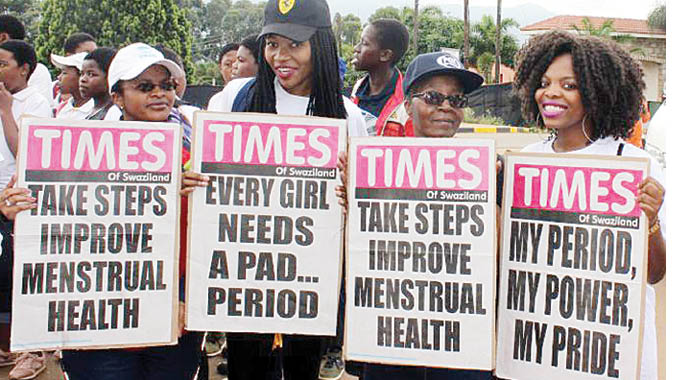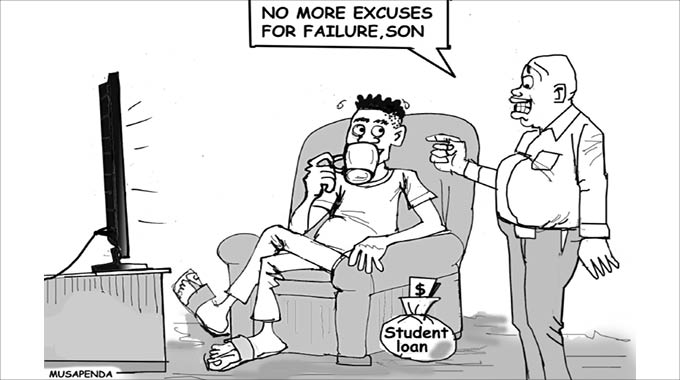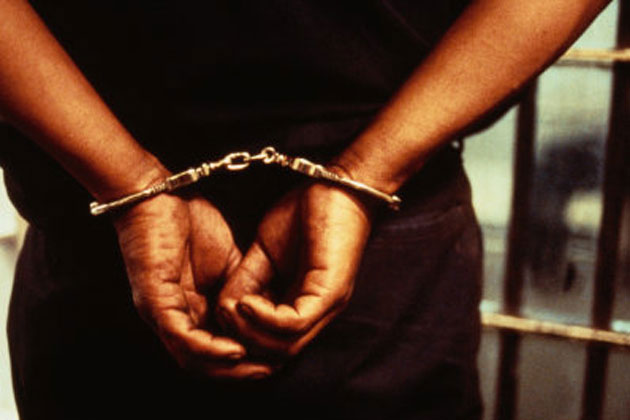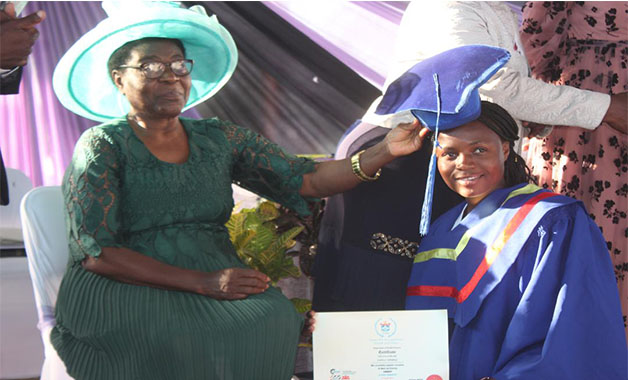Managing menstrual hygiene with pride and dignity

Gibson Mhaka, Senior Features Reporter
Menstrual Hygiene Day (MH Day) went unnoticed for Winnet Moyo (19) of Kensington on the outskirts of Bulawayo.
Visually-impaired Winnet professed ignorance of the global event marked every May 28 to raise awareness on the challenges women and girls face due to menstruation and to highlight possible solutions to the challenges.
The event which was celebrated under the theme “It’s Time for Action”, and also meant to provide a platform to advocate for making menstrual hygiene management a part of local, national, and global policies, came at a time when access to menstrual hygiene products is a major challenge facing women and girls in developing countries as they try to manage their menstruation with dignity.
In addition to the challenges she faces, Winnet also has a physical challenge and in a bid to reduce the risk of slips and falls, her grandmother has designed a rope that is her guide to a bucket behind her house that she uses as a toilet.
Beyond her granny’s daily struggles in modifying the yard to fit her special needs, safety and health concerns, managing her menstrual hygiene with pride and dignity is one of Winnet’s unique anxieties as a visually impaired young woman.
Winnet said keeping clean during her menstrual period is a herculean task for her, especially where information on menstruation and sexual reproductive health and rights (SRHR) are not readily available and accessible to women and girls with disabilities.
“Dealing with menstrual hygiene is stressful and difficult for visually impaired women like me. It’s even more difficult for young girls as they are always worried about how to deduce that their period has arrived or how to use products like pads correctly.
“It’s also difficult for them to wash their clothes, as they can’t see if they are clean or still bloodstained. As for me, I’m also constantly worried that my dress will be stained during my period. Just imagine, I’ll never be able to tell the colour of my discharge during menstruation,” said Winnet, throwing her hands in the air like one who has been abandoned and forsaken.
Her experience is a textbook case of a myriad of challenges being encountered by women and girls with disabilities in managing their menstrual hygiene which sometimes leaves them at the risk of even more health problems.
They also struggle to attain SRHR and gender equality as they continue to face double marginalisation and discrimination due to the interface of gender and disability.
According to disability rights activists, although girls and women with disabilities in Zimbabwe are known to face different challenges in their everyday living and demands according to the category of their disability, one of the biggest health challenges that they are facing is of managing their menstrual hygiene.
Misinformation surrounding menstruation hygiene is also contributing to shame, stigma and serious human rights concerns for girls and women with disabilities and their families. This undoubtedly makes them vulnerable to gender discrimination, violence, poverty and untreated health problems.
Although there are no official statistics on the total number or percentage of women and girls with disabilities in Zimbabwe, according to the Inter-Censal Survey, the proportion of male to females with disabilities is 56 and 44 percent.
The World Health Organisation (WHO) estimates that about 1,8 million Zimbabweans live with some form of disability. Importantly, research has found out that most women and girls with disabilities are not aware of their SRHR, a factor that puts them at risk of infection and an indication on their exclusion from the SRHR programmes.
Rights advocates say many are excluded from school, work, relationships and daily life.
Ms Nancy Siziba (34) who is hearing and speech impaired bemoans the inability of health care staff to speak sign language saying that such inability is detrimental to the well being of women and girls with disabilities.
Speaking through a sign language interpreter, Ms Siziba from Bulawayo’s Nketa suburb said after experiencing abnormal uterine bleeding she encountered serious communication problems when she visited a local clinic because none of the health care staffers were adept at sign language.
“Even if I go to the clinic like what I did after experiencing abnormal uterine bleeding, nurses can’t speak sign language so they tell me nothing about menstrual hygiene,” complained Ms Siziba.
She said this was to the disadvantage of women and girls with disabilities, as they could not understand hygiene in terms of their health and menstrual hygiene management.
From her grievances, it is clear that the understanding of menstrual hygiene among women and girls with disabilities is not sufficiently addressed by authorities in the health sector.
As a result they tend to rely on their families for information on how to manage their menstrual hygiene.
She said it was important to create systems that allowed universal access to healthcare information by persons with disabilities, as enshrined in Section 75 of the
Constitution of Zimbabwe on the right to health care which states that every citizen and permanent resident of Zimbabwe has the right to access to basic health care services, including those of a reproductive nature.
Bulawayo City Council Director of Health Services, Dr Edwin Sibanda, said the city’s health centres are now accessible to everybody who seeks SRHR services.
“It must be remembered that the clinics offer primary health care and in a bid to be inclusive, council in conjunction with the Association of the Deaf (ASSOD) sent at least two staff members per clinic to learn basic sign language at King George in 2017.
“Regards access to SRHR, the BCC is also working with various groups representing diverse populations such as Disabled Women in Africa, Sexual Rights Centre; Centre for Sexual Health and HIV/Aids Research Zimbabwe (CeSHHAR) so that we reach our constituencies,” said Dr Sibanda.
Ms Sibonisiwe Mazula, coordinator of the Zimbabwe Down’s Syndrome Association (ZDSA), a private and voluntary organisation working with parents of children living with the condition said women and girls with disabilities continue to suffer violations of their SRHR despite the fact that the Government ratified the United Nations Convention on the Rights of People with Disabilities.
“First of all, people think that women and girls with disabilities are asexual and that’s a wrong perception.
The major challenge facing especially those with Down’s Syndrome when it comes to their SRHR is the management of their menstruation hygiene as there are no health carers to assist them.
“This is because they differ in their level of understanding and some are still struggling to cope with their menstrual period despite the fact that they are above 30 years and they need regular assistance and care from their families during their periods.
“Even if the information is availed to them, some don’t understand it because of their level of education and the way sometimes that information will be packaged,” said Ms Mazula whose daughter also lives with the condition.
The issue of menstrual hygiene among marginalised groups such as women and girls with disabilities also seems to lack regional and global attention.
For example, a new gender analysis report – Southern African Development Community (Sadc) SRHR Strategy 2019-2030 makes no reference to the topic on menstrual health.
The Sustainable Development Goals (SDGs), otherwise known as the Global Goals just like the Sadc SRHR Strategy 2019-2030 also has no explicit guidelines that promote or enforce governments to provide for menstrual health management.
That too little attention on menstrual care, by these two key regional and international instruments undoubtedly fuelled by various social, cultural, and religious restrictions disproportionately affects the majority of economically marginalised women and girls in the region particularly those with disabilities.
The 2018 Sadc Gender Barometer SHRH chapter, though it recognises the provision of hygiene and investment in factors that promote menstrual health for women and girls, including those in prison, it is however silent on those with disabilities.
According to UNFPA, that lack of focus on menstrual health management specifically for women and girls with disabilities by key regional and international actors is perhaps driven by the assumption that menstrual health management is not typically a life-threatening issue.
National chairperson of the Zimbabwe Women with Disabilities in Development (ZWIDE), Ms Constance Sibanda said for women and girls with disabilities to embrace menstruation as a symbol of their power rather than something to be embarrassed about, more investment is required into their education and awareness programmes.
“Women and girls with disabilities are facing serious challenges in accessing information on how to manage their menstrual health or hygiene. For example, there is no information on SRHR in Braille,” observed Ms Sibanda.
Permanent Secretary in the Ministry of Health and Child Care, Dr Agnes Mahomva, acknowledged that there was a gap in their programmes especially to do with SRHR services for marginalised people like those with disabilities.
“The Ministry coordinates the sexual and reproductive health programmes guided mainly by the Adolescent and Youth Sexual and Reproductive Health Strategy 2016 to 2020, Family Planning Strategy (FMS) and Zimbabwe National HIV and Aids Strategic Plan (ZNASP 11) of the same period.
The idea is to provide age- appropriate interventions especially to vulnerable people.
“The Ministry tries to streamline disabled people in its programmes but realises the gap which still exists.
It also notes the challenge of menstrual hygiene which leads to girls in most communities missing school and as a result the Ministry is working with NGOs with interest in girls and women issues such as Katswe Sistarhood and Shamwari Yemwanasikana.
The Disability Association of Zimbabwe has also presented their strategic plan whose thrust is to streamline disability issues in ministry strategies and policies,” said Dr Mahomva.
Renowned gender activist and chief executive officer of Plan International, Ms Anne-Birgitte Albrectsen, in a report, Let Me Decide and Thrive, produced through collaboration with the UN Special Rapporteur on the Rights of Persons with Disabilities, said women and girls with disabilities are often kept in the dark about their SRHR .
Failure to address the SRHR needs of girls and women with disabilities, Ms Albrectsen said, often results in them being in the dark on how to protect themselves against abuse, pregnancy and diseases.
“Women and girls with disabilities are often infantilised and robbed of the power they need to make decisions about their own lives.
People view them in deeply unhelpful and distorted ways, like failing to recognise that they have the same concerns around sexuality and relationships as everyone else,” Ms Albrectsen said.
She said particularly in developing countries, these misconceptions drastically reduce the likelihood of them receiving the vital knowledge and tools they need to keep themselves safe from sexual abuse, unwanted pregnancies and sexually-transmitted diseases.










Comments